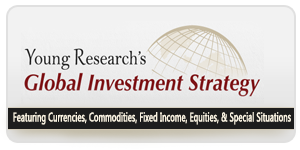 This is an excerpt from Young Research’s Global Investment Strategy (June 2015 issue), where we help investors compound wealth with investment strategies that span the global investment landscape. We cover the global stock and bond markets as well as currencies and commodities. Young Research’s Global Investment Strategy is designed for the investor who does not want his investment success bound by the opportunities of a single market.
This is an excerpt from Young Research’s Global Investment Strategy (June 2015 issue), where we help investors compound wealth with investment strategies that span the global investment landscape. We cover the global stock and bond markets as well as currencies and commodities. Young Research’s Global Investment Strategy is designed for the investor who does not want his investment success bound by the opportunities of a single market.
The Chinese market has recently entered the land of bubble conditions with vengeance. The Shanghai Composite index is up 152% over the last year, and the Shenzhen index, which is dominated by tech firms, is up 191%.
The catalyst for the bubble in Chinese shares started off innocently enough. China decided to open up a trading link between Shanghai and Hong Kong to allow investors to move capital between the two locations. Better liquidity in Chinese shares was probably justification for a modest rally of 10-20%, but anything beyond that should be considered a liquidity-fueled speculative bubble. A bubble that, oddly enough, is being encouraged by the Chinese government.
A Pump & Dump On the Peasants
Why would the Chinese government encourage a bubble in Chinese shares? A couple reasons are likely. A bubble allows the Chinese government to issue shares of some the nation’s state-owned enterprises (SOEs) at much better values than it could without a bubble. For the overly indebted SOEs, an equity bubble allows them to pay off debt by issuing overvalued equity. If you are a member of the ruling class, what’s better than a pump and dump scheme that comes at the expense of the peasants?
Real Estate Bust = Stock Bubble
The more important reason it’s likely China is encouraging a stock market bubble is that the nation’s policymakers are making a desperate attempt to contain the damage from a deflating real estate bubble.
According to Bank of America, Chinese households hold roughly 60% of their wealth in property (including all of those unoccupied apartment buildings you may have read about). With real estate values in China sinking, the wealth of households is falling. Plunging wealth typically isn’t a recipe for an economic boom.
If the losses in the Chinese property market accelerate without an offsetting gain in wealth, China’s economy could face a hard landing. So it would appear that China is taking a play out of the Fed’s playbook and inflating a new bubble to help remedy the property bust. Chinese households own about 5X as much property as they do stocks, so stocks must rise by much more than real estate prices fall to make Chinese households whole. That hasn’t been an obstacle in China. The Shenzhen market has more than doubled YTD, offsetting as much as a 20% collapse in property prices.
Bubble Values Not Sustainable
The problem with creating a stock bubble to deal with a property bust is that if the stock market gains in China aren’t supported by the fundamentals (they aren’t) the gains are unlikely to be sustained. China’s policymakers are encouraging its people to buy companies with shaky and in some case fraudulent finances to deal with a property bubble of their own making.
Fraud and Deception
Take the example of Zeus Entertainment. Up until March of this year, Zeus was named Kemain Wood Industry. It made composite floorboards. Sales of wood flooring started slumping as China’s property bust intensified, so Kemain decided to change its name to Zeus Entertainment and get into the online gaming business. After the name change in March of this year, the company’s share price doubled. Zeus and a series of other firms are now being accused of fabricating themes and telling stories to inflate their share prices. Typical behavior during an investment mania.
Even for the companies with decent fundamentals, the multiples that Chinese investors are paying are off the charts. The median company in Shanghai now trades at 75X earnings. You have some firms that operate in basic industries with modest growth prospects trading at multiples of over 200X earnings. The Chinese market has potential disaster written all over it.
An Unpredictable Beast
The question in China, and in the U.S. as well, is not a matter of if, but when the speculative blow-off ends. Periods of speculative excess are fueled not by fundamentals but by sentiment, and sentiment is an unpredictable beast. We could be looking at anything from a few more weeks to a few more years of a market that is hostile to long-term investment.
